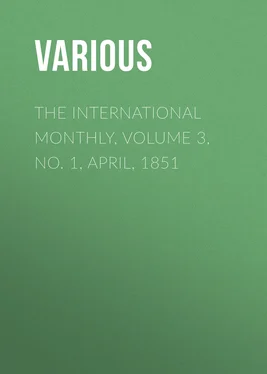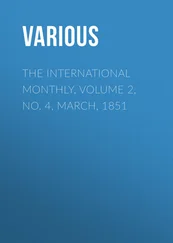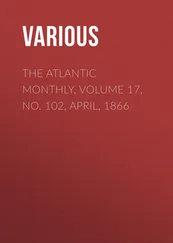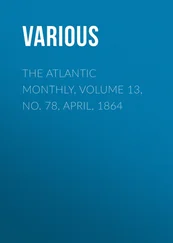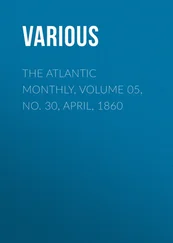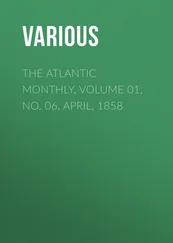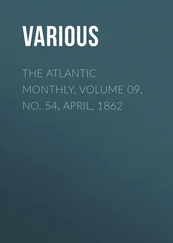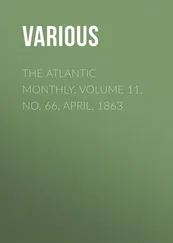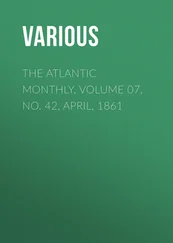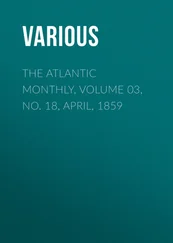Various - The International Monthly, Volume 3, No. 1, April, 1851
Здесь есть возможность читать онлайн «Various - The International Monthly, Volume 3, No. 1, April, 1851» — ознакомительный отрывок электронной книги совершенно бесплатно, а после прочтения отрывка купить полную версию. В некоторых случаях можно слушать аудио, скачать через торрент в формате fb2 и присутствует краткое содержание. Жанр: foreign_antique, periodic, foreign_edu, на английском языке. Описание произведения, (предисловие) а так же отзывы посетителей доступны на портале библиотеки ЛибКат.
- Название:The International Monthly, Volume 3, No. 1, April, 1851
- Автор:
- Жанр:
- Год:неизвестен
- ISBN:нет данных
- Рейтинг книги:3 / 5. Голосов: 1
-
Избранное:Добавить в избранное
- Отзывы:
-
Ваша оценка:
- 60
- 1
- 2
- 3
- 4
- 5
The International Monthly, Volume 3, No. 1, April, 1851: краткое содержание, описание и аннотация
Предлагаем к чтению аннотацию, описание, краткое содержание или предисловие (зависит от того, что написал сам автор книги «The International Monthly, Volume 3, No. 1, April, 1851»). Если вы не нашли необходимую информацию о книге — напишите в комментариях, мы постараемся отыскать её.
The International Monthly, Volume 3, No. 1, April, 1851 — читать онлайн ознакомительный отрывок
Ниже представлен текст книги, разбитый по страницам. Система сохранения места последней прочитанной страницы, позволяет с удобством читать онлайн бесплатно книгу «The International Monthly, Volume 3, No. 1, April, 1851», без необходимости каждый раз заново искать на чём Вы остановились. Поставьте закладку, и сможете в любой момент перейти на страницу, на которой закончили чтение.
Интервал:
Закладка:
Mr. Cooper has the faculty of giving to his pictures an astonishing reality. They are not mere transcripts of nature, though as such they would possess extraordinary merit, but actual creations, embodying the very spirit of intelligent and genial experience and observation. His Indians, notwithstanding all that has been written to the contrary, are no more inferior in fidelity than they are in poetical interest to those of his most successful imitators or rivals. His hunters and trappers have the same vividness and freshness, and in the whole realm of fiction there is nothing more actual, harmonious, and sustained. They evince not only the first order of inventive power, but a profoundly philosophical study of the influences of situation upon human character. He treads the deck with the conscious pride of home and dominion: the aspects of the sea and sky, the terrors of the tornado, the excitement of the chase, the tumult of battle, fire, and wreck, are presented by him with a freedom and breadth of outline, a glow and strength of coloring and contrast, and a distinctness and truth of general and particular conception, that place him far in advance of all the other artists who have attempted with pen or pencil to paint the ocean. The same vigorous originality is stamped upon his nautical characters. The sailors of Smollett are as different in every respect as those of Eugene Sue and Marryat are inferior. He goes on board his ship with his own creations, disdaining all society and assistance but that with which he is thus surrounded. Long Tom Coffin, Tom Tiller, Trysail, Bob Yarn, the boisterous Nightingale, the mutinous Nighthead, the fierce but honest Boltrope, and others who crowd upon our memories, as familiar as if we had ourselves been afloat with them, attest the triumph of this self-reliance. And when, as if to rebuke the charge of envy that he owed his successes to the novelty of his scenes and persons, he entered upon fields which for centuries had been illustrated by the first geniuses of Europe, his abounding power and inspiration were vindicated by that series of political novels ending with The Bravo, which have the same supremacy in their class that is held by The Pilot and The Red Rover among stories of the sea. It has been urged that his leading characters are essentially alike, having no difference but that which results from situation. But this opinion will not bear investigation. It evidently arose from the habit of clothing his heroes alike with an intense individuality, which under all circumstances sustains the sympathy they at first awaken, without the aid of those accessories to which artists of less power are compelled to resort. Very few authors have added more than one original and striking character to the world of imagination; none has added more than Cooper; and his are all as distinct and actual as the personages that stalk before us on the stage of history.
To be American, without falling into Americanism, is the true task that is set before the native artist in literature, the accomplishment of which awaits the reward of the best approval in these times, and the promise of an enduring name. Some of our authors, fascinated very excusably with the faultless models of another age, have declined this condition, and have given us Spectators and Tattlers with false dates, and developed a style of composition of which the very merits imply an anachronism in the proportion of excellence. Others have understood the result to be attained better than the means of arriving at it. They have not considered the difference between those peculiarities in our society, manners, tempers, and tastes, which are genuine and characteristic, and those which are merely defects and errors upon the English system; they have acquired the force and gayety of liberty, but not the dignity of independence, and are only provincial, when they hoped to be national. Mr. Cooper has been more happy than any other writer in reconciling these repugnant qualities, and displaying the features, character, and tone of a great rational style in letters, which, original and unimitative, is yet in harmony with the ancient models.
NELL GWYNNE
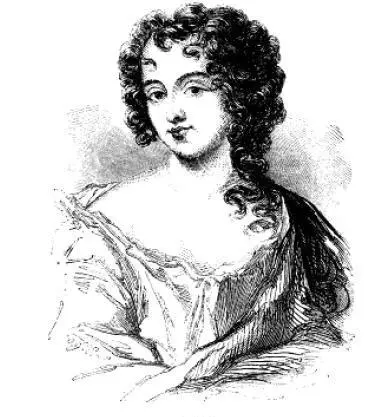
The above picture is from Sir Peter Lely's portrait, copied in the Memoirs of Grammont. Nell Gwynne has been the heroine of a dozen books, in the last ten years, and a very interesting work respecting her life and times is now being published in The Gentleman's Magazine . We copy the following article, with its illustrations, from the Art Journal , in which it appears as one of Mrs. S. C. Hall's "Pilgrimages to English Shrines."
There may be some who will object to the application of so honored a term to the dwelling of an actress of lost repute; but surely that may be a "shrine" where consideration can be taught—where mercy is to be learned—and—that which is "greater" than even faith and hope—charity!
However agreeable may be the present, and we have no reason to complain of it in any way, there is inexhaustible delight in reverting to the past. We do not mean living over again our own days; for though, if we could "pick and choose," there are sundry portions of our lives we might desire to repeat, yet, beginning from the beginning, taking the bad and the good "straight on," there can be few, men or women, who would willingly pass again through the whole of a gone-by career. And this, properly considered, is one of our greatest blessings; stifling much of vain regret, and teaching us to "look forward" to the future. We have always had, if we may so call it, a domestic rambling propensity; a desire to see "dwellings," not so much for their pictorial as their, so to say, personal celebrity: and sometimes, as on our visit to Barley Wood, this longing comes upon us at the wrong season, when a cheerful fire at "home" would be a meet companion. It is now six years ago—six years, last month—that, pacing along Pall Mall, we paused, and turned to the left hand corner of St. James's Square, full of painful and un-English memories of the Asiatic court of the second Charles; the sovereign who had endured adversity without discovering that "sweet are its uses;" who had "suffered tribulation" without "learning mercy"—the king who makes us doubt if, as a people, we have any claim to what is called "national character"—for the change that came over England, within a few brief years, from gloomy fanaticism to reckless license, is one of the marvels that give to history the aspect of romance. We had been walking round Whitehall, 2recalling the change that had swept away nearly all relics of the past in that quarter, and strolled so far out of our home-ward path to look at the house in Pall Mall (recently removed from its place) which tradition says was the dwelling of Nell Gwynne, besides her apartment at Whitehall, to which she was entitled by virtue of her office as lady of the bed-chamber to a most outraged queen. One of our friends remembers supping in the back room on the ground-floor of that very house, the said room being called "the Mirror Chamber," because the walls were panelled with looking-glass 3. There are others who affirm that Nelly lodged at the opposite side of Pall Mall, because Evelyn gossips of her leaning from her window, "talking to the king," who was lounging in St. James's Park, thereby wounding the propriety of many, who think vice only vice when it becomes notorious. Evelyn was always sadly perplexed by his faithful and high devotion to Charles, the king, and his abhorrence of the vices of Charles, the man; while Pepys jogged on, sometimes in the royal seraglio, sometimes at church, sometimes with my Lady Castlemaine, sometimes with "Knip" at the "king's house," seeing, admiring, and repeating—his morality held in abeyance; and yet always, even to the kissing of "Mistress Nelly," "a sweet pretty soul," companioned by his wife. If Pepys was a curiosity, what must Madame Pepys have been! 4What must the "court set" of those days have been, when we are absolutely refreshed by turning from them to the uneducated but frank-hearted and generous woman,—tainted as she is to all history by the worse than imperfections arising out of her position, yet redeemed in a degree, by virtues, which, in that profligate court, were entirely her own!
Читать дальшеИнтервал:
Закладка:
Похожие книги на «The International Monthly, Volume 3, No. 1, April, 1851»
Представляем Вашему вниманию похожие книги на «The International Monthly, Volume 3, No. 1, April, 1851» списком для выбора. Мы отобрали схожую по названию и смыслу литературу в надежде предоставить читателям больше вариантов отыскать новые, интересные, ещё непрочитанные произведения.
Обсуждение, отзывы о книге «The International Monthly, Volume 3, No. 1, April, 1851» и просто собственные мнения читателей. Оставьте ваши комментарии, напишите, что Вы думаете о произведении, его смысле или главных героях. Укажите что конкретно понравилось, а что нет, и почему Вы так считаете.
